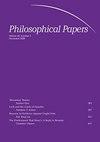Global Public Reason, Diversity, and Consent
IF 1.3
3区 哲学
0 PHILOSOPHY
引用次数: 1
Abstract
Abstract In this paper, I examine global public reason as a method of justifying a global state. Ultimately, I conclude that global public reason fails to justify a global state. This is the case, because global public reason faces an unwinnable dilemma. The global public reason theorist must endorse either a hypothetical theory of consent or an actual theory of consent; if she endorses a theory of hypothetical consent, then she fails to justify her principles; and if she endorses a theory of actual consent, her theory will lead to a highly unstable political system. On either side of the dilemma, global public reason faces untenable implications. Although similar criticisms have been advanced against domestic public reason, my argument is not repeating points made before me. My argument is new, in that it raises these objections specifically against global public reason, and in that it shows how, due to increased diversity of belief in the global arena, these problems are more pressing for global public reason than they are for domestic public reason.全球公共理性、多样性和同意
在本文中,我考察了全球公共理性作为一种证明全球国家正当性的方法。最后,我的结论是,全球公共理性无法证明全球国家是合理的。之所以如此,是因为全球公共理性面临着一个无法战胜的困境。全球公共理性理论家必须要么认可一个假设的同意理论要么认可一个实际的同意理论;如果她赞同假设同意的理论,那么她就不能证明她的原则是正确的;如果她赞同实际同意的理论,她的理论将导致一个高度不稳定的政治体系。在这一困境的任何一方,全球公共理性都面临着站不住脚的影响。尽管对国内公共理性提出了类似的批评,但我的论点并不是在重复我之前提出的观点。我的论点是新的,因为它提出了这些反对全球公共理性的反对意见,因为它表明,由于全球舞台上信仰的多样性增加,这些问题对全球公共理性来说比对国内公共理性来说更紧迫。
本文章由计算机程序翻译,如有差异,请以英文原文为准。
求助全文
约1分钟内获得全文
求助全文
来源期刊

Philosophical Papers
PHILOSOPHY-
CiteScore
2.10
自引率
0.00%
发文量
18
期刊介绍:
Philosophical Papers is an international, generalist journal of philosophy edited in South Africa Original Articles: Articles appearing in regular issues are original, high-quality, and stand-alone, and are written for the general professional philosopher. Submissions are welcome in any area of philosophy and undergo a process of peer review based on initial editor screening and refereeing by (usually) two referees. Special Issues: Topic-based special issues are comprised of both invited and submitted papers selected by guest editors. Recent special issues have included ''Philosophy''s Therapeutic Potential'' (2014, editor Dylan Futter); ''Aging and the Elderly'' (2012, editors Tom Martin and Samantha Vice); ''The Problem of the Criterion'' (2011, editor Mark Nelson); ''Retributive Emotions'' (2010, editor Lucy Allais); ‘Rape and its Meaning/s’ (2009, editor Louise du Toit). Calls for papers for upcoming special issues can be found here. Ideas for future special issues are welcome.
 求助内容:
求助内容: 应助结果提醒方式:
应助结果提醒方式:


